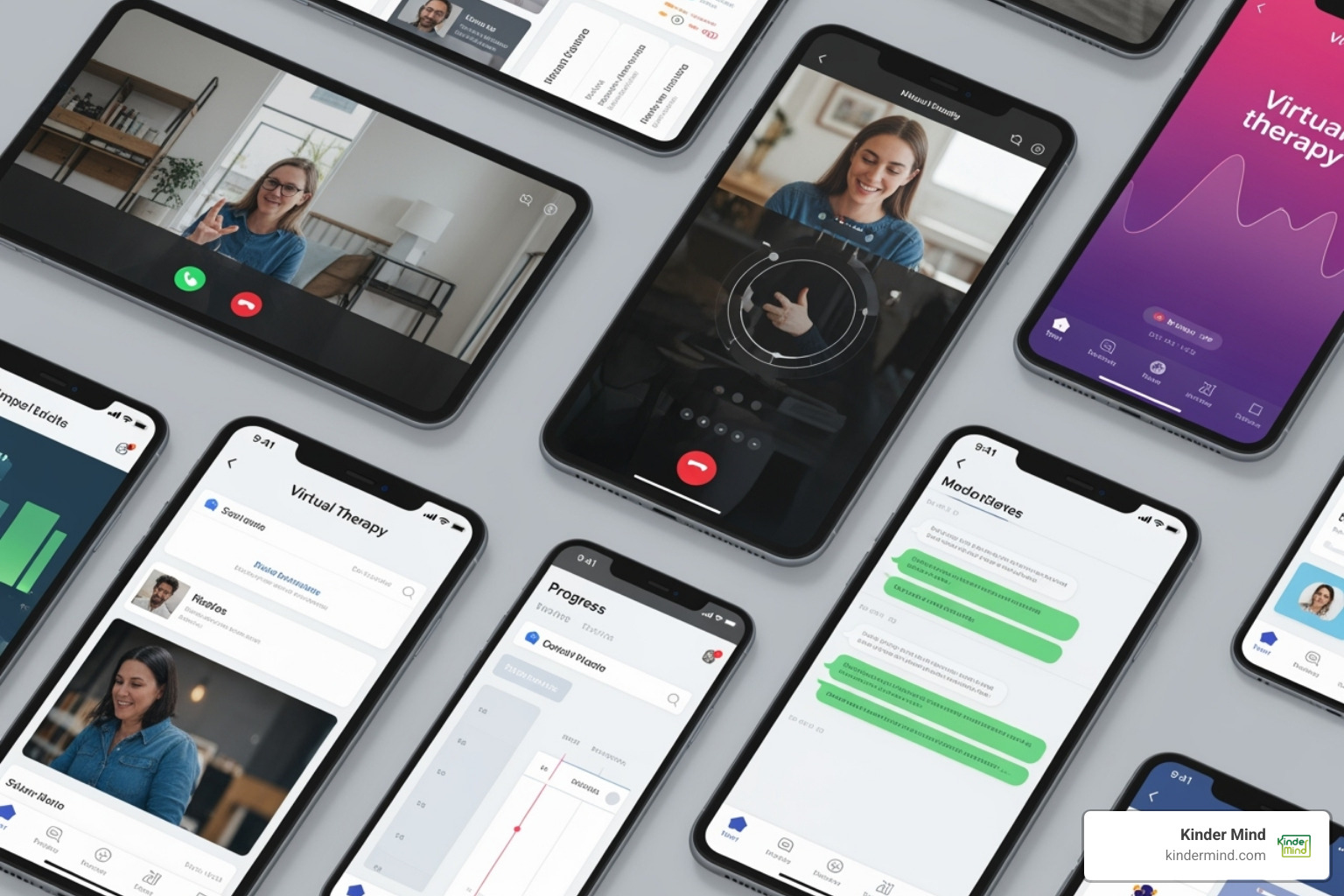Your Screen, Your Sanctuary: Finding Relief with Virtual Therapy for Specific Conditions
Why Virtual Therapy for Depression Matters Now More Than Ever

Virtual therapy for depression is changing how millions access mental health care. With over 21 million American adults affected by depression annually, getting help is crucial but often difficult due to barriers like time, cost, and stigma.
Technology offers a new path forward, removing these obstacles and making professional support more accessible than ever.
Quick Answer:
- What it is: Professional therapy delivered via video, messaging, or apps.
- Who it helps: People with mild to moderate depression needing flexible care.
- How it works: Connect with licensed therapists from home on any device.
- Effectiveness: Studies show it's as effective as in-person therapy, with 70% of people seeing improvement in 3 months.
- Cost: Often more affordable, with many insurance plans now offering coverage.
Virtual therapy isn't about replacing traditional methods; it's about expanding options so more people can get the help they need, when they need it, in a way that fits their lives. Research consistently shows that online therapy produces symptom reductions comparable to face-to-face treatment, making it a powerful and evidence-based choice for managing depression.
What is Virtual Therapy and How Can It Help with Depression?
Virtual therapy for depression brings a licensed mental health professional to your screen, allowing you to get support from wherever you feel most comfortable. Also known as telehealth or online therapy, it uses technology like video calls, phone sessions, or messaging to deliver real mental health care.
If you're experiencing depression symptoms like persistent sadness, loss of interest, or feelings of worthlessness, virtual therapy provides a safe space to address them. Using proven methods like Cognitive Behavioral Therapy (CBT) or Dialectical Behavior Therapy (DBT), your therapist helps you identify unhelpful thought patterns and develop healthier coping skills. The digital format doesn't change the therapeutic approach; it just changes the location.
Research shows that strong, trusting therapeutic relationships form just as effectively in virtual settings. In fact, some people find it easier to open up from the comfort of their own space. The consistency offered by virtual platforms—making it easier to keep appointments—is key to building trust and making real progress.
At Kinder Mind, we've seen how accessible virtual therapy can transform lives. Our online mental health counseling and specialized therapy for depression are designed around your needs.
The Benefits of Choosing Online Therapy
- Accessibility: Get expert care regardless of your location, mobility, or proximity to a therapist's office.
- Convenience: Fit therapy into your life without the hassle of travel, parking, or taking significant time off work. 98% of users find it more convenient.
- Privacy: Seek help discreetly from your own home, which can make taking the first step feel less intimidating.
- Cost-Effectiveness: Save on session fees, gas, and parking. Virtual providers often have lower overhead, making care more affordable.
- Wider Choice: Connect with a therapist whose specialty and personality are the right fit, not just who is geographically close.
- Comfort: Feeling safe and relaxed in your own environment can help you engage more deeply in the therapeutic process.
Potential Drawbacks and Limitations
- Technology Issues: A stable internet connection and reliable device are necessary. Dropped calls or frozen screens can be disruptive.
- Lost Nuances: Some non-verbal cues can be harder for therapists to read through a screen.
- Not for Crises: Virtual therapy is not designed for mental health emergencies. If you are in crisis or have thoughts of self-harm, call 988 or go to the nearest emergency room.
- Privacy Challenges: Finding a truly private space can be difficult if you live with others.
- Screen Fatigue: For those who already spend hours on screens, adding another video call can feel draining.
- Personal Preference: Some people simply prefer the dynamic of in-person interaction, and that's a valid choice.
Exploring the Different Types of Virtual Therapy for Depression
Virtual therapy for depression comes in several formats, allowing you to choose what works best for you.
- Therapist-Led Therapy: This is the most common model, involving live sessions with a licensed professional. It includes video sessions that mimic face-to-face appointments and phone sessions for voice-only interaction.
- Asynchronous Messaging: This allows you to write to your therapist on your own time and receive a thoughtful response, typically within 24 hours. It's great for processing thoughts between live sessions.
- Self-Guided Programs: These are structured digital tools, often based on Cognitive Behavioral Therapy (CBT), that you work through at your own pace. They can be effective for mild depression or as a supplement to other treatments. Some free online counseling for depression resources use this model.
- Blended-Care Models: This hybrid approach combines self-guided digital tools with regular check-ins from a therapist, offering both structure and personalized support.
- Prescription Digital Therapeutics (PDTs): These are FDA-cleared, software-based interventions prescribed by a clinician to treat specific conditions like depression under clinical supervision.

The Role of Modern Technology in Treatment
Technology is not just a delivery method; it's enhancing treatment itself.
- Mental Health Apps: Provide on-demand tools like mood trackers, guided meditations, and coping exercises.
- Wearable Technology: Smartwatches and fitness trackers offer objective data on sleep, activity, and heart rate, revealing patterns that can inform treatment.
- Virtual Reality (VR): Used for immersive exercises like practicing social skills in a safe environment. Cognitive Behavioral Immersion (CBI) in the metaverse has shown significant success in reducing depression and anxiety.
- AI-Powered Chatbots: Offer immediate, 24/7 support, guiding users through exercises or providing a conversational outlet.
These tools make virtual therapy for depression more engaging, personalized, and accessible.
Is Virtual Therapy Right for You?
Consider these questions to decide if virtual therapy is a good fit:
- How severe are my symptoms? Virtual therapy is excellent for mild to moderate depression. Severe symptoms or thoughts of self-harm require in-person care. If you are in crisis, call 988 or go to the nearest emergency room immediately.
- Am I comfortable with technology? You'll need reliable internet and a device, and feel at ease communicating through a screen.
- What does my schedule look like? If your schedule is packed, the convenience of online therapy can be the deciding factor in getting consistent care.
- Do I have a private space? Confidentiality is key, so you'll need a place where you can speak openly without being overheard.
- How do I best connect with others? If you're comfortable opening up through video or text, virtual therapy can feel natural. If you need physical presence, in-person may be better.
Kinder Mind offers both in-person and virtual therapy, ensuring you can find the approach that works for you.
How Effective is Online Therapy and How Do I Choose a Provider?
When considering virtual therapy for depression, the most important question is: "Does it work?" The research is overwhelmingly positive.
Studies consistently show that online therapy leads to significant improvements. Roughly 70% of people see symptom improvement within three months, and 80% report their online experience was as effective or more effective than in-person sessions. Research on online CBT effectiveness demonstrates that people experience genuine symptom reduction and a better quality of life.
Convenience also plays a key role in success. Because it's easier to attend sessions, people stick with treatment longer, which is a major predictor of positive outcomes.

How effective is virtual therapy for depression?
The evidence is clear: virtual therapy is a well-established, effective treatment. Evidence-based methods like Cognitive Behavioral Therapy (CBT) and Interpersonal Therapy (IPT) are delivered with the same integrity as in-person care.
A systematic review of digital CBT confirmed its effectiveness across various formats, with blended interventions (combining digital tools and human support) showing particularly strong results. When compared directly, virtual therapy produces comparable symptom reduction and client satisfaction to in-person therapy. The therapeutic alliance—the bond between you and your therapist—develops just as strongly through a screen, and the positive changes are long-lasting.
What to look for in a provider for virtual therapy for depression
Choosing the right provider is key. Here’s what to look for:
- Licensing: Ensure the therapist is licensed to practice in your state. This is a legal and ethical requirement. The team at Kinder Mind is fully licensed in the states they serve, which you can review on the Our Therapists page.
- Specialization: Look for a therapist with experience treating depression using evidence-based approaches like CBT or DBT.
- Treatment Approach: Make sure the therapist's style—whether it's talk-focused or includes skill-building exercises—aligns with your preferences.
- Platform Security: The platform must be HIPAA-compliant to protect your private health information. Look for features like end-to-end encryption.
- Therapeutic Fit: You need to feel comfortable with your therapist. A good fit is crucial for success. Virtual platforms like Kinder Mind make it easy to switch therapists if the first one isn't the right match.
- Crisis Protocols: A responsible provider will be clear about their limitations and direct you to emergency services for crises. This transparency is a sign of a provider who prioritizes your safety.
Navigating the Practicalities: Cost, Insurance, and Privacy
Understanding the logistics of virtual therapy for depression is key to making it a sustainable part of your life. Fortunately, it's often more straightforward and affordable than you might think.
Virtual therapy can cost less than in-person sessions due to lower overhead for providers and savings on your travel and time. Payment models vary, from subscription plans offering a set number of sessions for a monthly fee to per-session pricing that provides more flexibility.
At Kinder Mind, we believe financial constraints shouldn't prevent you from getting help. We offer various payment options, including insurance and reduced-rate plans. You can learn more about our commitment to affordable therapy on our website.

Does Insurance Cover Virtual Therapy?
Yes, most major health insurance plans now cover virtual therapy. As telehealth has become a standard benefit, your mental health coverage likely extends to online services.
- In-Network vs. Out-of-Network: An in-network provider has a contract with your insurer, meaning you'll likely only pay a co-pay. An out-of-network provider may require you to pay upfront and seek partial reimbursement.
- Verify Your Benefits: Call your insurance company to ask about your co-pay, deductible, and any session limits for telehealth mental health services.
- Employee Assistance Programs (EAPs): Check if your employer offers an EAP, which often includes several free therapy sessions.
- Superbills: If you see an out-of-network provider, ask for a superbill (a detailed receipt) to submit to your insurance for reimbursement.
Kinder Mind accepts many insurance plans and can help you verify your coverage on our insurance page. We also offer guidance on finding online therapy that takes insurance.
Ensuring Your Privacy and Security Online
Reputable virtual therapy platforms prioritize your privacy with robust security measures.
- HIPAA Compliance: This is a federal law that sets the standard for protecting patient health information. Any legitimate provider must be HIPAA-compliant.
- End-to-End Encryption: This technology scrambles your communication, ensuring only you and your therapist can access it.
- Secure Platforms: Professional providers use specialized telehealth platforms, not generic video chat apps, for improved security.
- Informed Consent: Before starting, you'll receive a document explaining how your data is protected and the limits of confidentiality.
You also play a role in your privacy. Use a private space, a password-protected device, and a secure Wi-Fi network for your sessions. Kinder Mind implements comprehensive security measures so you can focus on your healing, not on your data.
Frequently Asked Questions about Virtual Therapy for Depression
Can I get medication through virtual therapy?
Yes, but it's important to know the distinction between therapy and psychiatry. While therapists provide talk therapy, they cannot prescribe medication. For that, you would use telepsychiatry to connect with a psychiatrist or psychiatric nurse practitioner.
These medical professionals can conduct virtual assessments, diagnose conditions, and prescribe and manage medications remotely. Many platforms, including Kinder Mind, offer integrated care, allowing your therapist and prescriber to work together on your treatment plan. Combining therapy and medication is often the most effective approach for depression.
What if I don't connect with my virtual therapist?
It's completely normal if you don't click with the first therapist you meet. The therapeutic relationship is one of the most important factors in successful treatment, so finding the right fit is essential.
One of the biggest advantages of virtual therapy for depression platforms is the ease of switching providers. Most allow you to request a new match with a simple, confidential process. Don't hesitate to find someone you feel truly comfortable and understood with—it's a crucial part of your care.
Is virtual therapy only for mild depression?
No. While virtual therapy is highly effective for mild to moderate depression, its role isn't limited to these cases. For more severe depression, it can be a valuable part of a comprehensive treatment plan, often used alongside medication management or as a way to maintain care after more intensive treatment.
However, it's critical to understand that virtual therapy is not a replacement for crisis services. If you are experiencing acute suicidal thoughts or are unable to keep yourself safe, you need immediate, in-person help. Reputable platforms have clear protocols to direct you to emergency services in these situations.
If you're experiencing thoughts of self-harm or suicide right now, please reach out for immediate help by calling 988 (the Suicide and Crisis Lifeline) or going to your nearest emergency room. You deserve support, and help is available.
Conclusion
Depression affects one in ten American adults, but you don't have to steer it alone. Virtual therapy for depression has removed many of the traditional barriers to care, making it more accessible, convenient, and affordable than ever before.
The evidence is clear: online therapy works. It delivers results comparable to in-person treatment, helping people find meaningful relief from their symptoms. From live video sessions to innovative digital tools, you have more options than ever to find an approach that fits your life and your needs.
While it's important to understand its limitations—it's not for crises and requires a stable internet connection—the benefits are changing mental health care. With robust privacy protections and expanding insurance coverage, getting quality support from the comfort of your home is a reality.
Kinder Mind is committed to making mental health support a right, not a luxury. We offer both in-person and virtual therapy across dozens of states, with licensed professionals who specialize in depression. Our flexible payment options, including insurance and reduced-rate plans, are designed to ensure you can get the care you deserve.
Choosing to seek help is a powerful act of self-compassion. The first step is often the hardest, but it's also the one that can change everything. Relief is within reach.
